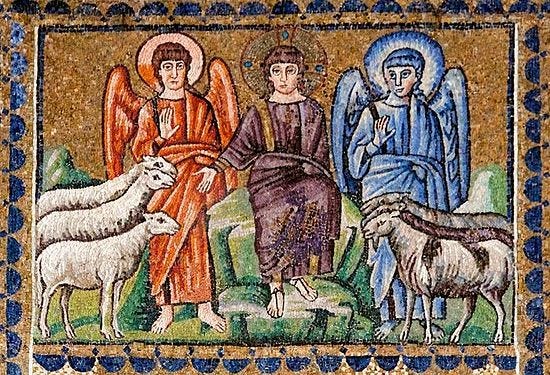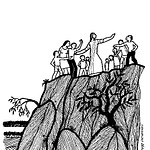The Church calendar is preparing to flip a page into a new year. Today, with Christ the King Sunday, we are closing out the liturgical calendar with the declaration that Jesus is indeed Lord, King, Savior, in charge, and reigning over all creation. To better prepare ourselves for the season of Advent, we look to what Christ tells us will happen upon his return. Rev. Fleming Rutledge writes, “There is no other day in the Christian calendar quite like this one. On this last Sunday of the liturgical year, we look both backward and forward. We look back on the completed story of the earthly ministry of Jesus as we have followed him all year from Christmas to Holy Week to Easter to Pentecost. But more, as the first Sunday of Advent approaches, we look forward on this day to the second coming of the Lord, the future time when, as Saint Paul writes, ‘Every knee will bow… and every tongue confess that Jesus Christ is Lord.’”[i]
The truth is often difficult to hear.
Growing up I can remember my grandmother receiving the Washington Post, Washington Times, along with The Wall Street Journal every morning in an attempt to figure out what was true in the daily news.
Colonel Jessup, in the 1992 film A Few Goodmen, was right. In the Colonel’s exchange with Lieutenant Kaffee, he shouted, “You can’t handle the truth! You don’t want the truth.”
Jesus’s final parable before he makes his way to the cross sets the scene for His final judgment. At first glance, Jesus’s parable reads like he has run out of grace. The Parable of the Final Judgment sounds like Jesus has reached the bottom of the no-matter-what-you-do-I-love-you barrel.
The soundtrack of the New Testament is grace.
Grace is God’s love for you. Grace is God’s unmerited favor.
In his letter to the Ephesians, Saint Paul drops this truth bomb:
“For by grace you have been saved through faith, and this is not your own doing; it is the gift of God – not the result of works, so that no one may boast.”[ii]
The sheep are moved to the right, and the goats are separated to the left.
The sheep fed the hungry.
The sheep offered water to the thirsty.
The sheep welcomed the stranger.
The sheep clothed the naked and cared for the sick.
The sheep visited prisoners.
And as the sheep did these things, the truth (unbeknownst to them) is they did these actions to Christ.
The sheep fed Jesus when he was hungry.
The sheep offered water to Jesus when he was thirsty.
The sheep welcomed Jesus when he was a stranger.
The sheep clothed Jesus when he was naked and cared for Jesus when he was sick.
The sheep visited Jesus when he was imprisoned.
Even though the sheep did not know the truth of what they were doing, the Good Shepherd rewarded them with an inheritance that had been prepared for them.
Then, there are the goats.
The goats did not do everything for Jesus that the sheep did.
So, the goats, like the talent-saving servant and the wedding banquet guest who refused to wear the correct garment, await eternal punishment.
We can read this parable and think that no matter how much we have done, the truth is that it is not enough, so we had better do more. This understanding of Jesus’s words is exacerbated because we live in the epicenter of personal achievement. We read this parable and naturally make it about us, and thus, we have decided that we have done enough to be considered sheep or we believe ourselves to be goats with work to do.
If Christianity can be distilled into doing what Jesus said, then there is no need for Jesus. If we can complete a checklist and save ourselves, then Jesus is not the Savior of the world, which means we can go ahead and cancel Advent and Christmas.
Do not misunderstand me.
Of course, what we do matters. Good works are important. Good works, by definition, are good!
But (and it’s a big but so you know it does not lie) the truth of Jesus’s final parable is that all our godly good deeds cannot be tallied on a heavenly scorecard. When presented with their calculated results, the sheep had no clue they were doing good to Jesus. The sheep asked, “Lord, when was it that we saw you hungry and gave you food, or thirsty and gave you something to drink? And when was it that we saw you a stranger and welcomed you, or naked and gave you clothing? And when was it that we saw you sick or in prison and visited you?”[iii]
The sheep had no clue what they had done. The works of the sheep were not done to be counted by the Good Shepherd. Instead, the sheep acted out of love and were caught up in the joy of the Good Shepherd.
So, what of the goats?
“Lord, when was it that we saw you hungry or thirsty or a stranger or naked or sick or in prison, and did not take care of you?”[iv]
Did you hear it?
“Lord, when was it that we saw you…and did not take care of you?”[v]
The goats did not not do good things.
They fed the hungry, offered water to the thirsty, welcomed strangers, clothed the naked, and even might have visited a prisoner. The goats came to the Good Shepherd prepared to justify themselves, believing dependence on their deeds was good enough.
The truth we cannot handle is that this final parable is not about the list of do-gooder achievements each of us counts. Before any of our good, bad, or indifferent works, God has been preparing a place for you for every last one of us.
The sheep were invited to a place that was prepared for them, prepared for you.
The place of punishment was not prepared for the goats. The goats do not have to go where they are going. They get to where they are going because they bought the lie they have earned, that which can only be inherited.
Heaven is full of nothing but forgiven sinners, who, through grace, become saints.
The truth is that whether you think of yourself as a sheep or a goat, we all find refuge in Christ Jesus abiding with us. Jesus is for you and always will be. Jesus’s promise to be with us is not because of your list of good things. No, Jesus is yours, mine, because of our inadequacy.
Here’s a truth I hope you can handle: Jesus is present in your hunger and thirst. Jesus is present when no one welcomes you. If you are sick or naked, remember you are clothed in the grace of God. And when you feel as though you are a prisoner to the demands of the goats, know that the Good Shepherd invites you to an inheritance greater than any nation or lesser lord can offer.
[i] Rutledge, Fleming. Advent. Eerdmanns. 2018. Pg. 231.
[ii] Ephesians 2:8-9, NRSV
[iii] Matthew 25:37-39, NRSV
[iv] Matthew 25:44, NRSV
[v] Matthew 25:44, NRSV

















